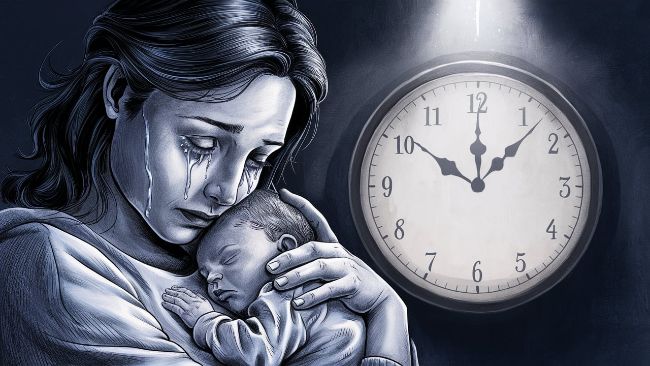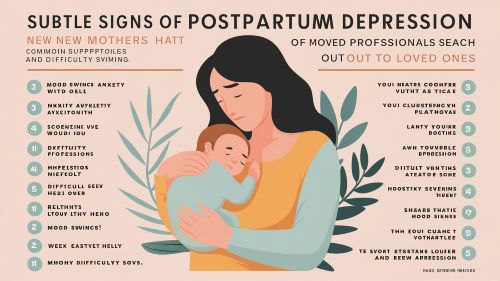You just brought a new life home. It is a moment of pure joy. But it can also feel overwhelming. Your emotions might be all over the place. You may feel happy one minute. Then, you might feel sad the next. This emotional rollercoaster is common. It is often driven by powerful forces. These forces are your hormones.
This article will explain everything. We will explore the hormonal shifts after birth. We will discuss how they affect your mood. We will help you understand the difference. The difference between the “baby blues” and postpartum depression (PPD). Most importantly, we will show you the path forward. You can find balance and feel like yourself again.
[WordPress Feature: Insert a Table of Contents plugin here. This is crucial for long-form content and user experience, which Google loves.]
What is the Postpartum Period?
The postpartum period is a time of transition. It begins right after you give birth. It technically lasts for six weeks. But for many mothers, it feels much longer. Your body is healing from childbirth. Your life has changed in a huge way.
During this time, your body works hard. It needs to return to its pre-pregnancy state. This involves massive physical and emotional adjustments. Hormones are at the center of this change. Understanding their role is the first step. It helps you navigate your new reality.
The Great Hormonal Shift: What Happens After Birth?
During pregnancy, your body is a hormone powerhouse. Levels of certain hormones soar. They support your baby’s growth. After you deliver your baby and the placenta, these hormone levels plummet. This sudden crash is a shock to your system. It is a primary driver of postpartum mood changes.
Let’s look at the key players. These hormones shape your postpartum experience.
[WordPress Feature: Use H3 headings for sub-topics to improve structure and SEO.]
Estrogen & Progesterone: The Dramatic Plunge
Estrogen and progesterone are the main pregnancy hormones. Their levels can be 100 times higher during pregnancy. They help maintain the uterine lining. They are crucial for your baby’s development. They also have mood-regulating effects.
After birth, these hormones drop suddenly. They fall to pre-pregnancy levels within days. This is like falling off a hormonal cliff. This sharp decline can trigger mood swings. It can cause irritability, anxiety, and sadness. It’s a major contributor to the baby blues.
Prolactin: The Mothering Hormone
While some hormones fall, others rise. Prolactin is one of them. Your brain releases it to stimulate milk production. This is why it’s called the “mothering hormone.” It helps you nurture your new baby.
Prolactin can have a calming, soothing effect. However, high levels can also suppress other hormones. This can contribute to a low mood or low libido. Its effects are complex. They are different for every single woman.
[WordPress Feature: Insert a simple custom graphic or infographic here. Title it “Postpartum Hormone Crash.” Show high bars for Estrogen/Progesterone during pregnancy and very low bars for Postpartum. Show Prolactin as low during pregnancy and high postpartum.]
Oxytocin: The “Love” and “Bonding” Hormone
Oxytocin is often called the “love hormone.” It surges during labor to help with contractions. It also surges during breastfeeding. It promotes a powerful bond between you and your baby. It creates feelings of love and connection.
This hormone helps counteract stress. It can make you feel calm and happy. However, things like stress and sleep deprivation can interfere. They can block oxytocin’s positive effects. This can make bonding feel more difficult.
Cortisol: The Stress Hormone
Cortisol is your body’s main stress hormone. Having a newborn is stressful. You are not sleeping. You are learning to care for a tiny human. Your routine is completely gone. All of these things can raise your cortisol levels.
Chronically high cortisol is not good. It is linked to anxiety and irritability. It can also disrupt your sleep even more. This creates a vicious cycle. Stress leads to poor sleep. Poor sleep leads to more stress. This can worsen your mood significantly.
[WordPress Feature: Use a Blockquote for emphasis. This makes text stand out.]
“The first few weeks postpartum are a biological storm. Your body is doing something incredible. Be patient with its process, and be kind to your mind.”
Thyroid Hormones: The Unseen Culprit
Your thyroid gland regulates your metabolism. It also plays a big role in your mood and energy. Pregnancy can affect your thyroid function. Some women develop postpartum thyroiditis. This is an inflammation of the thyroid gland.
It can first cause hyperthyroidism (high levels). This leads to anxiety and irritability. Then it can cause hypothyroidism (low levels). This leads to fatigue, weight gain, and depression. Its symptoms often mimic PPD. It is vital to get your thyroid checked if you feel unwell.
Baby Blues vs. Postpartum Depression (PPD): Knowing the Difference
Many people use “baby blues” and “PPD” interchangeably. But they are very different. Understanding this difference is key. It helps you know when to wait it out. And it tells you when to seek professional help.

What are the “Baby Blues”?
The baby blues are very common. They affect up to 80% of new mothers. They are considered a normal part of postpartum recovery. The symptoms are directly related to the hormone crash, stress, and lack of sleep.
Symptoms of the Baby Blues often include:
- Sudden mood swings
- Feeling weepy or crying for no reason
- Anxiety and restlessness
- Irritability or impatience
- Feeling overwhelmed
- Trouble sleeping (even when the baby is asleep)
The key feature of the baby blues is timing. Symptoms usually appear 2-3 days after birth. They peak within the first week. Then, they fade away on their own within two weeks. They do not typically interfere with your ability to care for your baby.
[WordPress Feature: Insert a comparison table here using a WordPress table block. Columns: Feature, Baby Blues, Postpartum Depression. Rows: Onset, Duration, Severity, Impact on Functioning, Need for Treatment.]
| Feature | The “Baby Blues” | Postpartum Depression (PPD) |
|---|---|---|
| Onset | Usually 2-3 days after birth | Can be anytime in the first year |
| Duration | Lasts no more than 2 weeks | Lasts more than 2 weeks |
| Severity | Mild mood swings and sadness | Intense, persistent sadness/emptiness |
| Impact | Does not stop you from caring for baby | Can make it hard to care for self/baby |
| Treatment | Resolves on its own with rest/support | Often requires professional treatment |
When Does it Become Postpartum Depression (PPD)?
Postpartum depression is a serious medical condition. It is a form of major depression. It is not a character flaw or a weakness. It affects about 1 in 7 new mothers. The hormonal shifts are a major trigger, but many other factors are involved.
PPD symptoms are more intense and last longer. They do not go away on their own. They can appear anytime within the first year after birth.
Symptoms of Postpartum Depression may include:
- Persistent feelings of sadness, hopelessness, or emptiness.
- Loss of interest or pleasure in activities you used to enjoy.
- Severe mood swings, anger, or rage.
- Feeling worthless, ashamed, or guilty.
- Withdrawing from family and friends.
- Changes in appetite (eating much more or much less).
- Inability to sleep (insomnia) or sleeping too much.
- Overwhelming fatigue or loss of energy.
- Difficulty bonding with your baby.
- Scary thoughts about harming yourself or your baby.
If you have these symptoms for more than two weeks, it is not the baby blues. It is time to reach out for help.
[WordPress Feature: Add a “Click to Tweet” block or a shareable graphic with the text: “PPD is not a weakness. It’s a medical condition. Asking for help is a sign of strength. #PPDepression #MaternalMentalHealth”]
Beyond Hormones: Other Factors That Influence Mood
Hormones set the stage for postpartum mood disorders. But they don’t tell the whole story. Several other factors increase your risk. Recognizing them can help you feel less alone.
- Extreme Sleep Deprivation: Newborns don’t sleep through the night. Chronic lack of sleep has a powerful negative effect on mood and cognitive function. It is a massive physical and mental stressor.
- Physical Recovery: Your body is healing from a major medical event. Whether you had a vaginal birth or a C-section, there is pain and discomfort. This physical stress can easily translate into emotional stress.
- Personal or Family History: If you have a history of depression or anxiety, you are at higher risk. A family history of mood disorders also increases your chances of developing PPD.
- Lack of Social Support: Feeling isolated is a huge risk factor. Not having a partner, family, or friends to help can feel incredibly lonely. It makes the challenges of new motherhood seem much bigger.
- Life Stressors: Other major life events can add to the pressure. This could be financial trouble, relationship problems, or a difficult baby. A traumatic birth experience can also be a significant trigger.
Taking Control: How to Manage Hormonal Mood Swings
You are not powerless against these changes. There are many practical steps you can take. These steps can help you manage your mood. They can support your body as it finds its new balance. This is about self-care and survival.
Prioritize Rest (Even When It Seems Impossible)
This is the most common advice for a reason. It is the most important. You must find ways to sleep.
- Sleep when the baby sleeps. Forget the laundry. Forget the dishes. Your health is the priority.
- Ask for help. Have your partner or a friend watch the baby. Even a 2-hour nap can make a world of difference.
- Work in shifts. If you have a partner, take turns with night feedings. This allows both of you to get a solid block of sleep.
Nutrition for Your Mood
What you eat directly affects your brain. Your body needs fuel to recover. Focus on nutrient-dense foods.
- Don’t skip meals. Low blood sugar causes irritability.
- Eat Omega-3s. Found in fish like salmon, and in walnuts and flaxseeds. They are great for brain health.
- Stay hydrated. Drink plenty of water, especially if you are breastfeeding. Dehydration can cause fatigue.
- Limit sugar and caffeine. They can lead to energy crashes and increase anxiety.
Gentle Movement and Fresh Air
Exercise might be the last thing on your mind. But gentle movement can be powerful.
- Go for a short walk. Even 10 minutes outside can help. Sunlight boosts Vitamin D and serotonin.
- Try postpartum yoga. Many gentle stretches can help relieve tension. Look for classes online or in your community.
- Just move your body. Put on some music and dance with your baby. Any movement is better than no movement.
[WordPress Feature: Add an internal link here to another relevant article on your site, for example, “5 Gentle Exercises for Postpartum Recovery.”]
Build Your Support System
Isolation is the enemy of postpartum wellness. You need your village now more than ever.
- Talk to someone. Tell your partner, a trusted friend, or a family member how you are feeling. Don’t hold it in.
- Join a new mom group. Connecting with other mothers who “get it” is incredibly validating. You will realize you are not alone.
- Accept offers of help. When someone offers to bring food or watch the baby, say yes. People want to help. Let them.
When to Seek Professional Help
Self-care strategies are vital. But sometimes they are not enough. PPD is a medical illness that often requires medical treatment. Knowing when to call a professional is a sign of great strength.
Seek help immediately if:
- Your “baby blues” last longer than two weeks.
- Your symptoms are getting worse, not better.
- You are having trouble caring for yourself or your baby.
- You lose interest in everything, including your baby.
- You feel hopeless or believe life is not worth living.
- You have any thoughts of harming yourself or your baby. This is a medical emergency. Call 911 or a crisis hotline right away.
Who to Talk To?
You have several options for professional support.
- Your OB/GYN or Midwife: They are often the first point of contact. They understand postpartum health and can screen you for PPD.
- Your Primary Care Doctor: They can also screen you, run blood tests (like for your thyroid), and refer you to a specialist.
- A Therapist or Counselor: Talk therapy is a highly effective treatment for PPD.
- A Psychiatrist: A medical doctor who specializes in mental health. They can diagnose conditions and prescribe medication.
What Are the Treatment Options?
Treatment for PPD is effective. Most women get better with help. The most common treatments are therapy and medication. Often, a combination of both works best.

- Therapy: Cognitive Behavioral Therapy (CBT) and Interpersonal Therapy (IPT) are proven to help. They give you tools to manage your thoughts and feelings.
- Medication: Antidepressants, like SSRIs, can correct the chemical imbalances in your brain. Many are safe to take while breastfeeding. Your doctor can help you find the right one.
[WordPress Feature: Add a visually distinct Call-to-Action box. Use a different background color and a button.]
You Are Not Alone. Help is Available.
If you are struggling, please reach out.
- Postpartum Support International: Call 1-800-944-4773 or visit postpartum.net
- National Suicide Prevention Lifeline: Call or text 988
[[Button] Find a Therapist Near You]
A Note for Partners and Loved Ones
If your partner is struggling, you may feel helpless. But your support is one of the most powerful tools for her recovery.
- Listen without judgment. Let her talk about her scary thoughts and feelings. Don’t try to “fix” it. Just listen.
- Take her seriously. If she says she is not okay, believe her. Encourage her to seek help and offer to make the appointment for her.
- Provide practical help. Don’t ask, “What can I do?” Instead, say, “I am going to handle the baby for the next three hours so you can sleep.”
- Reassure her. Tell her she is a good mother. Tell her this is temporary. Tell her you love her and you will get through this together.
Frequently Asked Questions (FAQ)
[WordPress Feature: Use an FAQ block or toggle/accordion block. This is excellent for SEO as Google often pulls these into search results.]
How long does the postpartum hormonal shift last?
The most dramatic plunge in estrogen and progesterone happens in the first few days. However, it can take weeks or even months for your entire endocrine system, including your thyroid and cortisol levels, to fully re-regulate. For breastfeeding mothers, hormones like prolactin remain high for much longer.
Can I get PPD even if I had an easy pregnancy and birth?
Yes, absolutely. While a traumatic birth can be a risk factor, PPD can happen to anyone after any type of birth experience. The biological and hormonal shifts happen regardless of how your pregnancy and delivery went.
Is it safe to take antidepressants while breastfeeding?
Many antidepressants, particularly SSRIs, are considered safe for breastfeeding. The amount that passes into breast milk is typically very small. Your doctor will work with you to choose the safest, most effective medication for your situation.
Will I ever feel like “myself” again?
Yes. This is a crucial message of hope. With time, support, and often treatment, you will feel like yourself again. Motherhood changes you, but the cloud of PPD will lift, and you will find joy and balance in your new identity.
Conclusion: You Are a Warrior
The postpartum period is a time of immense hormonal upheaval. This biological storm profoundly impacts your mood. It can bring the short-term baby blues or the more serious challenge of postpartum depression. It is not your fault. You did not cause this.
Understanding the role of your hormones is empowering. It helps you see that these feelings have a physical cause. It is the first step toward seeking the support you deserve. You are navigating one of life’s biggest transitions. Be gentle with yourself. Ask for help. You are a warrior, and you will get through this.
